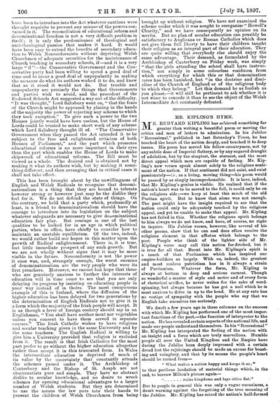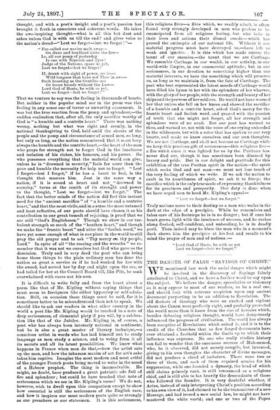MR. KIPLING'S HYMN.
MR. RUDYARD KIPLING has achieved something far greater than writing a beautiful poem or moving the critics and men of letters to admiration. In his Jubilee "Recessional," published in last Saturday's Times, he has touched the heart of the nation deeply, and touched it to deep issues. His poem has moved his fellow-countrymen, not by any subtle dose of Imperial flattery, or by any sugared draught of adulation, but by the simplest, the sternest, and the most direct appeal which men are capable of feeling. Mr. Kip- ling's new verses speak almost solely to the religious senti- ment of the nation. If that sentiment did not exist, and exist passionately—i.e., as a living, moving thing—his poem would be passed by as simply incomprehensible. It is here, indeed, that Mr. Kipling's genius is visible. He realised that if the nation's heart was to be moved to the full, it could only be on the religions side ;—we keep at least this much of the old Puritan spirit. But to know that alone was not enough. The poet might have the insight required to see that the nation could only be adequately touched by the religions appeal, and yet be unable to make that appeal. Mr. Kipling has not failed in this. Whether the religious spirit belongs to him always we do not know, and have, of course, no right to inquire. His Jubilee verses, however, like several of his other poems, show that he can and does often receive the religious element in that afflatus which belongs to the poet. People who think of the lighter side of Mr. Kipling'a verse may call this notion far-fetched, but it is true for all that. Burnt into Mr. Kiplings's spirit is a touch of that Puritanism which has inspired our empire-builders so largely. With us, indeed, the greatest and most zealous patriotism has in it always a strain of Puritanism. Whatever the form, Mr. Kipling is always at bottom in deep and serious earnest. Though so wonderful a master of style and metre and of every form of rhetorical artifice, he never writes for the sake of word- spinning, but always because he has got a nail which he is most anxious to drive in up to the head. He at any rate has no vestige of sympathy with the people who say that we English take ourselves too seriously.
We dwelt a few years ago in these columns on the success with which Mr. Kipling has performed one of the most impor- tant functions of the poet—the function of interpreter to the nation. He has revealed certain aspects of the national life, and made our people understand themselves. In his "Recessional" Mr. Kipling has interpreted the feeling of the nation with an insight and a force which are truly marvellous. Humble people all over the United Kingdom and the Empire have daring the Jubilee been deeply impressed with a certain dread lest the rejoicings should be made an excuse for boast- ing and vainglory, and that by its means the people's heart should be turned from- " What makes a nation happy and keeps it SO; " to that perilous laudation of material things which, in the end, to borrow Milton's phrase again— ruins kingdoms and lays cities flat."
But to people in general this was only a vague uneasiness, a dumb warning against the forgetting of the true meaning of the Jubilee. Mr. Kipling has seized the nation's half-formed
thought, and with a poet's insight and a poet's passion has brought it forth in conscious and coherent words. He takes the awe-inspiring thought—what is all this but dust and ashes unless God is with us till the end ? and gives voice to the nation's dread—" Lest we forget—lest we forget ! "—
" Far-called our navies melt away— On dune and headland sinks the fire—
Lo, all our pomp of yesterday Is one with Nineveh and Tyre ! Judge of the Nations, spare us yet, Lest we forget—lest we forget!
If, drunk with sight of power, we loose
Wild tongues that have not Thee in awe—
Such boasting as the Gentiles use Or lesser breeds without the Law— Lord God of Hosts, be with us yet, Lest we forget—lest we forget !"
That we venture to say was the feeling in thousands of hearts. But neither in the popular mind nor in the poem was this feeling in any sense one of terror or unworthy abasement. It was but the true reaction from the pomp and splendour,—the sudden realisation that, after all, the only sacrifice worthy of God is "a humble and a contrite heart." There was nothing wrong, nothing but what was right and seemly, in the national thanksgiving to God, held amid the shouts of the people and the pomp and circumstance of armed men, so long, but only as long, as the nation remembered that it must keep always the humble and the contrite heart,—the heart of the man who prays for strength not to forget God in the loneliness and isolation of his riches, his honours, and his power. He who possesses everything that the material world can give, unless he is "drowned in security," feels far more than the poor and humble the necessity for help not to forget. "Lest
I forget—lest I forget," if he has a heart to feel, is the thought that masters him. Just in the same way a nation, if it is sound at heart and not..." drowned in security," turns at the zenith of its strength and power to the thought, "Lest we forget—lest we forget." The fact that the better minds of the nation did feel this instant need for the "ancient sacrifice" of "a humble and a contrite
heart," and that the most virile, and in a sense the most untamed and least reflective, of our poets should have chosen it as his contribution to our great tumult of rejoicing, is proof that we are still "God's Englishmen." Though we show in our tur- bulent strength so much of the "heathen heart," and though we make the "frantic boast" and utter the "foolish word," we have yet sense enough of what is our place in the world to still pray the old prayer and to ask "Thy mercy an thy people, Lord." In spite of all "the roaring and the wreaths "we re- member that it was not we ourselves but God who gave us the dominion. Truly and in very deed the poet who can bring home these things to the plain ordinary man has done the nation as great a service as if he had worked for her with the sword, had served her by day and night upon the sea, or had toiled for her at the Council Board till, like Pitt, he sank overwhelmed with cares not his own.
It is difficult to write fully and from the heart about a poem like that of Mr. Kipling without saying things that must seem to foreigners like either hypocrisy or self-adula- tion. Still, on occasion these things must be said, for it is sometimes better to be misunderstood than not to speak. We should like to ask our readers in what other country in the world a poet like Mr. Kipling would be touched to a note of deep seriousness, of elemental piety if you will, by a celebra- tion like that of the Jubilee. Mr. Kipling is, of course, a poet who has always been intensely national in sentiment, but he is also a great master of literary technique,—a conscious artist in words who has laid himself out to study language as men study a science, and to wring from it all its secrets and all its latent possibilities. We know what happens in France when men do that,—how the artist eats up the man, and how the inhuman maxim of art for art's sake takes him captive. Imagine the most modern and most artful of the younger French poets being moved to write in the mood of a Hebrew prophet. The thing is inconceivable. He might, no doubt, have produced a great patriotic ode full of fire and splendour; but could he have touched that note of seriousness which we see in Mr. Kipling's verse? We do not, however, wish to dwell upon this comparison except to show how essential is still the seriousness of the English race, and how it inspires our most modern poets quite as strongly as our preachers or our statesmen. It is this seriousness, -- this religious fibre—a fibre which, we readily admit, is often found very strongly developed in men who profess to be emancipated from all religions feeling, but who belie in their lives and actions their dismal creeds—which has proved the antiseptic of our national life. Without it our material progress must have destroyed us,—have left us weak and ignoble.. It is this which has made untrue the taunt of our enemies,—the taunt that we are Carthage. We resemble Carthage in our wealth, in our activity, in our world-wide Empire, in our commercial aptitude; but in our seriousness, in our devotion to something higher than our material interests, we have the something which will preserve us, as long as we maintain it, from the fate of Carthage. The poet who best represented the latest moods of Carthage would have filled his hymn to her with the splendour of her wharves, with the glory of her people, with the strength and beauty of her shipsand the prowess of her soldiers. He would not have warned her that unless she fell on her knees and showed the sacrifice of a humble and a contrite heart, asked God's mercy for the frantic boast and foolish word, and prayed with the passion of truth that she might not forget, all her strength and splendour were of no avail. But our poet has warned us thus, and warned us, not with the voice of one crying unheeded in the wilderness, but with a voice that has spoken to our very hearts, and made us know ourselves and our own thoughts. We are not Carthage, and shall not become as Carthage while we keep this precious gift of seriousness—this religious fire— a fire which since it was lighted for us by the Puritans has never died out, though it has sometimes been dimmed by luxury and pride. But in our delight and gratitude for this exhibition of the true Puritan spirit in the nation—the spirit which seeks God and not man—we must not lose touch of the very feeling of which we write. If we ask the nation to exult in its humbleness of spirit, we ask it to forego the sacrifice which is the only true mode of ex pressing thankfulness for its greatness and prosperity. Our duty is done when we have urged men to heed Mr. Kipling's appeal " Lest we forget—lest we forget."
Truly nations move to their destiny as a man who walks in the dark at the edge of a precipice. While he remembers and takes care of his footsteps he is in no danger ; but if once his heart grows light with the insolence of success, and he rushes along flushed, self-confident, and unheeding, he is in deadly peril. Then indeed may he bless the man who in a moment's flash shows him the precipice at his feet and recalls to hit mind the prayer of men and of nations :—
"Lord God of Hosts, be with us yet Lest we forget—lost we forget."



































 Previous page
Previous page